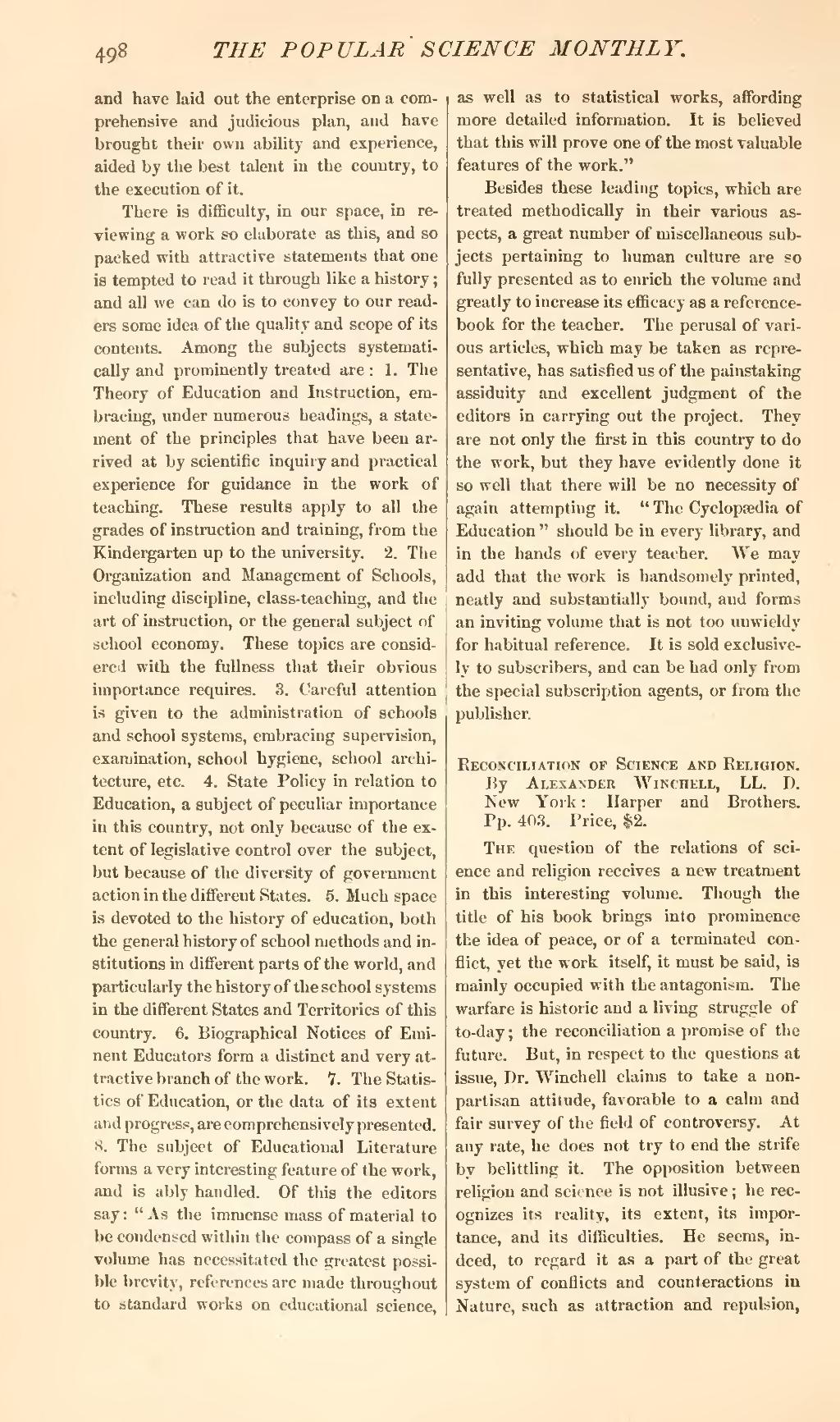and have laid out the enterprise on a comprehensive and judicious plan, and have brought their own ability and experience, aided by the best talent in the country, to the execution of it.
There is difficulty, in our space, in reviewing a work so elaborate as this, and so packed with attractive statements that one is tempted to read it through like a history; and all we can do is to convey to our readers some idea of the quality and scope of its contents. Among the subjects systematically and prominently treated are: 1. The Theory of Education and Instruction, embracing, under numerous headings, a statement of the principles that have been arrived at by scientific inquiry and practical experience for guidance in the work of teaching. These results apply to all the grades of instruction and training, from the Kindergarten up to the university. 2. The Organization and Management of Schools, including discipline, class-teaching, and the art of instruction, or the general subject of school economy. These topics are considered with the fullness that their obvious importance requires. 3. Careful attention is given to the administration of schools and school systems, embracing supervision, examination, school hygiene, school architecture, etc. 4. State Policy in relation to Education, a subject of peculiar importance in this country, not only because of the extent of legislative control over the subject, but because of the diversity of government action in the different States. 5. Much space is devoted to the history of education, both the general history of school methods and institutions in different parts of the world, and particularly the history of the school systems in the different States and Territories of this country. 6. Biographical Notices of Eminent Educators form a distinct and very attractive branch of the work. 7. The Statistics of Education, or the data of its extent and progress, are comprehensively presented. 8. The subject of Educational Literature forms a very interesting feature of the work, and is ably handled. Of this the editors say: "As the immense mass of material to be condensed within the compass of a single volume has necessitated the greatest possible brevity, references are made throughout to standard works on educational science, as well as to statistical works, affording more detailed information. It is believed that this will prove one of the most valuable features of the work."
Besides these leading topics, which are treated methodically in their various aspects, a great number of miscellaneous subjects pertaining to human culture are so fully presented as to enrich the volume and greatly to increase its efficacy as a reference book for the teacher. The perusal of various articles, which may be taken as representative, has satisfied us of the painstaking assiduity and excellent judgment of the editors in carrying out the project. They are not only the first in this country to do the work, but they have evidently done it so well that there will be no necessity of again attempting it. "The Cyclopædia of Education" should be in every library, and in the hands of every teacher. We may add that the work is handsomely printed, neatly and substantially bound, and forms an inviting volume that is not too unwieldy for habitual reference. It is sold exclusively to subscribers, and can be had only from the special subscription agents, or from the publisher.
Reconciliation of Science and Religion. By Alexander Winchell, LL. D. New York: Harper and Brothers. Pp. 403. Price, $2.
The question of the relations of science and religion receives a new treatment in this interesting volume. Though the title of his book brings into prominence the idea of peace, or of a terminated conflict, yet the work itself, it must be said, is mainly occupied with the antagonism. The warfare is historic and a living struggle of to-day; the reconciliation a promise of the future. But, in respect to the questions at issue. Dr. Winchell claims to take a nonpartisan attitude, favorable to a calm and fair survey of the field of controversy. At any rate, he does not try to end the strife by belittling it. The opposition between religion and science is not illusive; he recognizes its reality, its extent, its importance, and its difficulties. He seems, indeed, to regard it as a part of the great system of conflicts and counteractions in Nature, such as attraction and repulsion,

